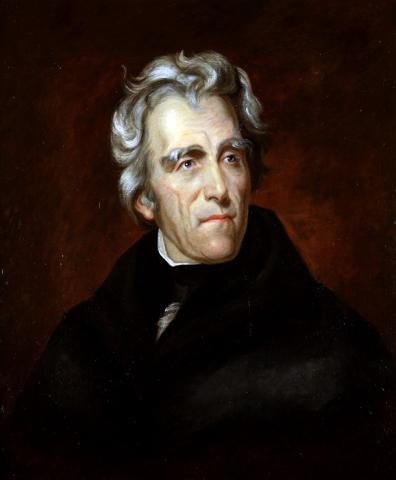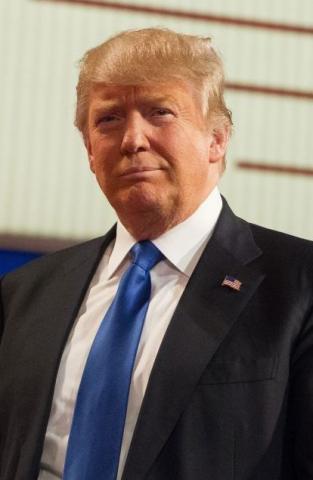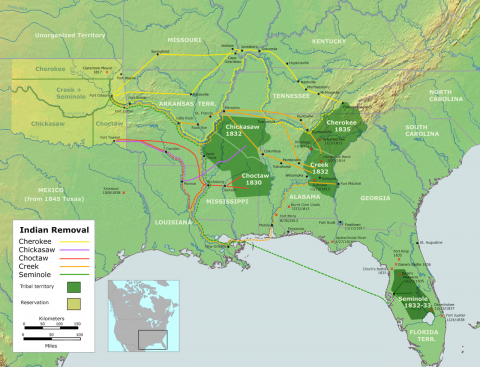Donald Trump is our Andrew Jackson


Andrew Jackson was elected President of the United States of America in 1828; Donald Trump will be elected 188 years later. What similarities do they share as political figures?
By Carolyn Yeager
FORGET RONALD REAGAN. TRUMP IS BIGGER AND BOLDER in his views and potential as a change-maker than our 40th president ever was. If elected, Trump will be equal to no less than our 7th president, the great Andrew Jackson.
I am not an expert on all the details of US history, but over the years I've come to appreciate Andrew Jackson to the point that I call him my favorite president. He was an interesting individual, and I like that he fought so hard for the people against the vested interests of the time, which were basically the same as now. I like that he put the American people, his people, first. He is nowadays condemned for the so-called “Trail of Tears” forced Indian relocation, and American schoolchildren are taught to see him as a terrible president for that reason. But I think he had his priorities straight in protecting his own people.
Andrew Jackson was a very polarizing political figure during the 1820s and 1830s. He served two terms from 1829 to 1837. To say Jackson was known as a fighter is an understatement. After being elected to the U.S. Senate as a Democratic-Republican, his supporters founded the Democratic Party, the one that still exists today although greatly changed, and he became the first president of the Democratic Party.
In like manner, Donald Trump is in the process of creating a new Republican Party, for which he has attracted the absolute enmity of many Republican establishment figures. If he is elected, he will be the first president of this 'new Republican Party.'
As a Tennessean, Jackson supported states' rights and the extension of slavery into the new western territories. As mentioned above, he forced the relocation of certain Indian populations in the South to reservations in the farther western part of the country because they couldn't co-exist peacefully with the European Americans. He fought mightily against the vested interests of the time in the form of the Bank of the United States (think Federal Reserve Bank today), and won.
A New Yorker, Trump wants to give control back to the states and localities in several key areas, such as education and health care - rolling back government by Washington DC fiat. He wants to re-energize and clean up black communities by making educational choice available and enforcing law-and-order. He strongly supports the police and all law-enforcement agencies. He wants to deport criminal aliens and stop the flow of human and drug traffic across the southern US border. He wants to end the overwhelming influence of special interests, corporate donors, and “pay for play” in all branches of the government.
To butress my headline claim, I have gone over the Wikipedia page for Andrew Jackson, which is pretty long, and gleaned from it what I see as other similarities between the two men.
Election of 1824
A Pennsylvania convention nominated Jackson for President. Albert Gallatin, the vice-presidential candidate on an opposing ticket, criticized Jackson as altogether unfit for the office." There were four candidates: Jackson, Wm. Crawford, John Quincy Adams and Henry Clay. Though Jackson won the most popular votes and a plurality of electoral votes, the election was decided by the House of Representatives, which chose Adams.
Jackson supporters denounced this result as a "corrupt bargain" because Clay gave his state's support to Adams, who subsequently appointed Clay as Secretary of State. Many voters believed the "man of the people" had been robbed by the "corrupt aristocrats of the East." [a rigged system]
Election of 1828
Jackson revived many of the ideals of the old Republican Party, gave it a new name as the Democratic Party [Trump seems to be doing the same, but the other way around], and forged a national organization of durability. Jackson, with John Calhoun as his running mate, handily defeated Adams in 1828.
Both candidates were rhetorically attacked in the press, which reached a low point when the press accused Jackson's wife Rachel of bigamy. Jackson also came under heavy attack as a slave trader who bought and sold slaves and moved them about in defiance of modern standards of morality. (He was not attacked for merely owning slaves.)
Presidency 1829-1837
"The Age of Jackson" shaped the national agenda and American politics.
Jackson feared that monied and business interests would corrupt republican values. When South Carolina opposed the tariff law he took a strong line in favor of nationalism and against secession.
Jackson believed that the president's authority was derived from the people. When selecting his Cabinet, instead of choosing party favorites, Jackson instead selected "plain, businessmen."
Jackson was the first President to invite the public to attend the ball honoring his first inauguration. Many poor people came to the inaugural ball in their homemade clothes. The crowd became so large … the White House became so crowded with people that dishes and decorative pieces inside were eventually broken.
Jackson's raucous populism earned him the nickname "King Mob." Similarly Trump is accused of arousing a destructive, anti-democratic populism.
The “Petticoat affair” – Salacious rumors spread that the wife of Jackson's Secretary of War, John Eaton, had been sexually promiscuous, or had even been a prostitute, as a barmaid in her father's tavern. The Cabinet wives insisted that the interests and honor of all American women was at stake. […] The upshot was a total revamping of the cabinet, with everyone resigning or being fired save the Postmaster General. Similarly, Trump's opposition want to paint his wife as immoral, although the Clinton sexual escapades make that difficult.
Indian removal policy – When tensions and violence between American settlers and the Indians increased, a movement to relocate certain Indian populations grew more popular. Jackson became an advocate for this relocation policy, and he had many supporters in both the Senate and House who agreed with his goal. On May 26, 1830 Congress passed the Indian Removal Act, which Jackson signed into law.
Reforms – In an effort to purge the government of corruption of previous administrations, Jackson launched presidential investigations into all executive Cabinet offices and departments. He believed appointees should be hired on merit and therefore withdrew many candidates he believed were lax in their handling of monies. Similarly, wasting the people's money is a big Trump complaint.
Jackson repeatedly called for the abolition of the Electoral College by constitutional amendment in his annual messages to Congress as President. Also for limiting the office of President to a single 4-year term.
Jackson's time in the presidency saw various improvements in financial provisions for veterans and their dependents. The Service Pension Act of 1832, for instance, provided pensions to veterans "even where there existed no obvious financial or physical need", while an Act of July 1836 enabled widows of Revolutionary War soldiers who met certain criteria to receive their husband's pensions.
Bank Veto – Jackson vetoed the bill to recharter the Second Bank of the United States in 1932 because he believed it was fundamentally a corrupt monopoly whose stock was mostly held by foreigners. He went on to win the 1932 election in a landslide.
Assassination – Jackson was the recipient of the first recorded physical attack on a U.S. President when an unemployed house painter aimed a pistol at Jackson, but it misfired. Trump has already been the object of death threats.
Temperament – Jackson's quick temper was notorious. Historian H.W. Brands says, "His audacity on behalf of the people earned him enemies who slandered him and defamed even his wife, Rachel. He dueled in her defense and his own, suffering grievous wounds that left him with bullet fragments lodged about his body."
Legacy – Historian Charles Grier Sellers says "Andrew Jackson's masterful personality was enough by itself to make him one of the most controversial figures ever to stride across the American stage."
Tags
Donald Trump, Andrew JacksonCategory
US elections- 621 reads











Comments
Andrew Jackson and the Cherokee
Jackson had no animosity toward the Cherokee. He adopted a Cherokee boy, who died. The idea of relocating the Cherokee was not fundamentally motivated by hostility toward the tribe. There were problems of jurisdiction because the Cherokee Nation overlapped several states. There was also gold discovered in the Cherokee territory, and some people like to make that the explanation, but I don't believe that this was Jackson's motive.
The "Trail of Tears" happened during the administration of Jackson's successor, Martin Van Buren.
Under Jackson, Representatives of the Cherokee had signed the Treaty of New Echota, promising to relocate to Oklahoma, and some of them abided by the treaty but many did not. Because of that, ultimately, they were forcibly relocated. The "Trail of Tears" strictly speaking refers to part of the journey through an area where there was no road for wagons and they had to walk.
Only those Cherokee living on Federal land were subject to the Treaty of New Echota. Cherokees who owned private property did not have to move.
The relocation was not all bad for the Cherokee. They are one of the few eastern Redskin tribes that still exists in significant numbers instead of being absorbed. They would still have their own territory if they had not given the Federal government an excuse to take it away by taking sides with the Confederacy.
Some have pointed out that living proximate to Whites was not good for the Cherokee, because they were preyed upon by merchants. Merchants would marry into the tribe in order to gain the legal right to sell firewater etc. to the Cherokee. The most famous opponent of relocation, Chief John Ross, was only 1/16 Cherokee, and was descended from one of those merchants. One suspects his motives.
Signed by Jackson
Yes, it did, but it was signed into law by Jackson in 1830, during his first term!
On May 26, 1830 Congress passed the Indian Removal Act, which Jackson signed into law.
As you said, the "trail of tears" forced march was only the last part of the process that took place after they had attempted to get them to leave voluntarily. So it happened in Van Buren's term, but he was not the one engaged in its passage. Jackson was, so he gets the blame. Just like Trump finds it politically expedient to blames Bill Clinton for NAFTA because he's the one who signed it.
Jackson, according to historian H. W. Brands, sincerely believed his population transfer was a "wise and humane policy" that would save the Indians from "utter annihilation".
If the key complaint about
If the key complaint about the removal of the Cherokee that did not abide by the treaty is that it was handled roughly and that some died along the way, that's not a matter of policy but of administration. Jackson might or might not have handled it differently than Van Buren.
Yes,
that's true.
Good comment about Andrew
Good comment about Andrew Jackson.
I miss your broadcasts. You were and are a one of a kind.
Panic
Jackson caused the Panic of '37 by demanding "specie payment" for government land. It might have been ok if he'd implemented it gradually. As it hapened the effects were longstanding. Ron Paul's End the Fed plank would have had the same effect, though I think he knew this. (It got him more public approval than any other proposal.) The Banksters could just pull a retreat from dollar hegemony, like the brexit run on the pound that is still continuing - to express their displeasure with Trump. (They now control the markets so thoroughly, including oil used to squeeze Russia.) but they have their own interests tied up in it - maybe have a war and shift the monetary center to Moscow.